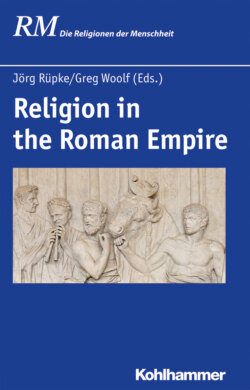Читать книгу Religion in the Roman Empire - Группа авторов - Страница 25
На сайте Литреса книга снята с продажи.
4 Conclusion
ОглавлениеGods and humans, the history of a city like Pompeii is above all that of two communities living together, a precarious harmony guaranteed by the celebration of regular rituals, in temples, in the public square, in the streets, in houses or on graves. In a society thus organised and hierarchical due to sacrifices that were intended to express the superiority of the gods over men, to speak of the gods is, then, inevitably, to speak of men. To describe the cult of Jupiter is to evoke the Roman identity of the inhabitants, the public oaths, the patronage over the assemblies (Jupiter is the god of public oaths), that is, at the foot of the altar of the local capitol. To speak of Venus is to talk about civic harmony, about maritime navigation and the life of corporations, especially textile craftsmen; it is also, of course, to talk about love and eroticism in a Roman city. To speak of Bacchus is to conduct a sociological study of wine, from the cultivation of vines on the slopes of Vesuvius to the drunkenness of banquets, of which there are so many testimonies in Pompeii. To examine the cult of the Lares is to better understand the social and topographical organization of a Roman house, the involvement of the family in neighbourhood life. Explaining funeral practices means defining the grave not only as a testimony to the rank of the deceased, but also as a place of worship, adapted to a ritual separation between the dead and the living. Faced with the richness of religious expressions encountered in Pompeii, the essential observation is that no area of human activity was spared by religion. From birth to death, at work or in the theatre, in one’s city or on a journey, piety was a daily concern, maintained by gestures of reverence towards the gods, a greeting in passing by a temple, a few grains of incense on the family altar, a toast during the banquet and then, from time to time, the sacrifice of a chicken or a pig in the yard of the sanctuary or in the garden of the house. This interweaving of religion and human life is so thorough that the study of the testimonies of religious activity reveals a whole section of the functioning of Pompeian society, completing our knowledge of the history of the city.
